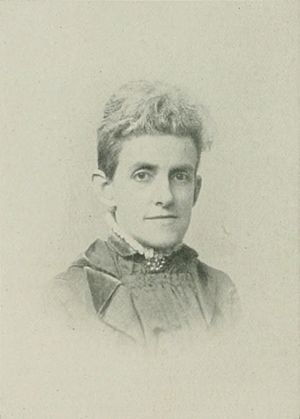Elnora Monroe Babcock facts for kids
Quick facts for kids
Elnora Monroe Babcock
|
|
|---|---|

"A Woman of the Century"
|
|
| Born | Elnora E. Monroe January 11, 1852 Columbus, Pennsylvania, U.S. |
| Died | December 29, 1934 (aged 82) Dunkirk, New York, U.S. |
| Occupation | suffragist |
| Language | English |
| Nationality | American |
| Alma mater | Jamestown High School, Lyons Musical Academy |
| Literary movement | suffrage |
| Spouse |
John W. Babcock
(m. 1870) |
Elnora Monroe Babcock (born January 11, 1852 – died December 29, 1934) was a very important leader in the movement for women's right to vote in America. She became interested in this work in 1889. For several years, she was in charge of press work for the National Woman Suffrage Association. She lived in Dunkirk, New York from 1880. Her name is on a bronze tablet in the New York State Capitol in Albany. This tablet honors many important women who fought for voting rights. Elnora Babcock passed away in 1934.
Contents
Elnora Babcock's Early Life and Schooling
Elnora E. Monroe was born in Columbus, Pennsylvania. Her birthday was January 11, 1852.
She went to Jamestown High School and then the Lyons Musical Academy. She graduated from both schools.
Elnora Babcock's Fight for Women's Rights
When she was eighteen, Elnora married John W. Babcock. He was a professor from Jamestown, New York. Later, he became the superintendent of schools in Dunkirk. That's where they made their home.
From a young age, Elnora felt it was unfair that women could not vote. She believed women should have a say in government, just like men. However, she was busy with her home life. Also, not many people around her agreed with her feelings at first.
In 1889, Elnora began to take an active part in the movement. Mostly because of her efforts, a "political equality club" started in Dunkirk. She became the president of this club. The club grew very well under her leadership.
Before her first year as president of the Dunkirk club ended, she was chosen to lead the Chautauqua County Political Equality Club. This county club was very well organized. It had twenty-five smaller clubs and 1,400 members. After her first year as president of the county club, she was chosen again.
On July 25, 1891, Elnora led the first women's voting rights meeting ever held at the Chautauqua Assembly. The county club asked for this meeting. This allowed the topic of women's voting rights to be discussed there.
Besides leading these clubs, Elnora also worked on many important committees. These committees were all connected to the voting rights movement. She even chaired the press department for the National Woman Suffrage Association. She cared deeply about all efforts to make humanity better. But she spent most of her time helping women get the right to vote. She believed this was the most important change needed in America at that time. She felt all other improvements depended on it.
Elnora Babcock's Personal Life
Elnora Babcock was a member of the Adams Memorial Unitarian church. She also belonged to the Woman's Alliance of that church. She was a member of the Women's Literary Club too. She passed away at her home in Dunkirk on December 29, 1934.
Elnora Babcock's Writings
- "Susan B. Anthony, a life sketch", 1906
- "Why Cannot Women Vote", 1902
 | Georgia Louise Harris Brown |
 | Julian Abele |
 | Norma Merrick Sklarek |
 | William Sidney Pittman |

